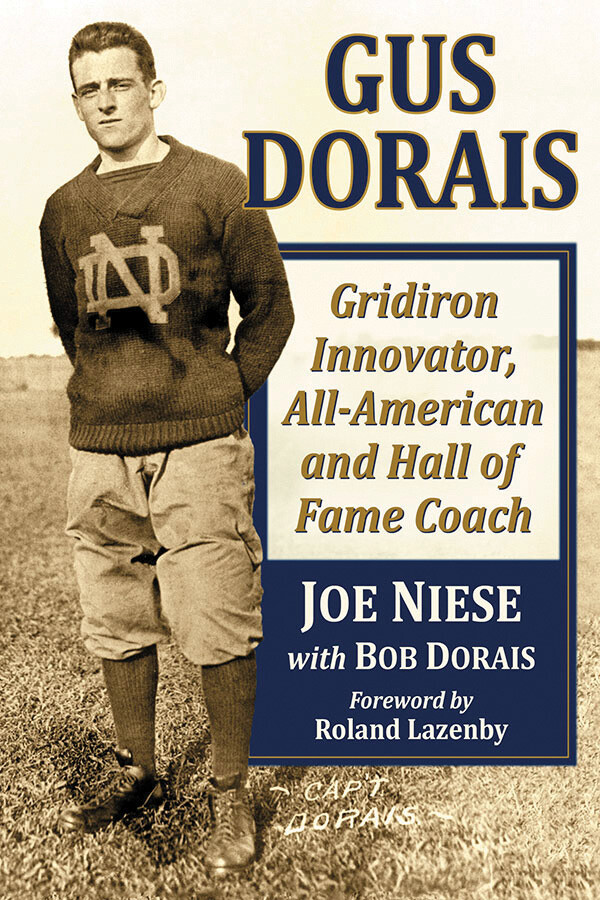Gus the Great
Chippewa Falls native who revolutionized football is focus of new biography

The modern game of football is centered on the forward pass. Today, quarterbacks and wide receivers attain yardage and reception statistics that, a half-century ago, would have been considered nearly inhuman; those numbers are now expected today in order to help your team to a championship.Just over one century ago, the concept of the forward pass was still revolutionary to football until a well-known man from Chippewa Falls helped establish the pass and other schemes now vital to the game we love.
Chippewa Falls author Joe Niese’s latest book, Gus Dorais: Gridiron Innovator, All-American and Hall of Fame Coach – which was co-written with Bob Dorais – is a thorough, comprehensive account of the life of Charles Dorais, known by the nickname “Gus” since his days playing for the University of Notre Dame. During that time in South Bend, Indiana, his friendship and connection to one of the preeminent football legends – Knute Rockne – allowed a sense of pigskin creativity to flourish. Niese’s book helps the reader understand that Dorais’ creativity dating back further, to his nascent athletic years in high school.
Through Niese’s prose, readers find themselves in a dorm room with Dorais and Rockne; in an office at the University of Detroit as Dorais converses with the press on future job prospects; and on a hot, alkali dust-covered field at the University of Texas. Niese does an exquisite job placing the reader in the context of the times, where one feels both what is unchanged and dramatically changed over the decades. Backgrounds of numerous relevant figures are included, from the life journeys of Dorais’ coaches at Notre Dame, to players who passed through his college programs when he became the skipper. One such player from his Gonzaga tenure developed into a key football innovator and NFL champion coach; he was surely inspired playing under Dorais in college.
Dorais is often remembered nationally for the summer on a Lake Erie beach in Ohio where he and Rockne worked on aspects of the forward pass; a plaque there marks the significance of that occasion. Yet the takeaway from Niese’s book is of Dorais as a far more complete football athlete – and a more complete man – than simply someone who developed a play. In terms of Dorais’s football life, Niese writes how Dorais used the then-uncommon practice of an overhead throw while quarterbacking the Chippewa Falls High School team in the late 1900s; how Dorais assisted Rockne in creating a scheme known as the “Notre Dame Box” that would enhance Rockne’s legendary status (and how Dorais evolved away from that system as his coaching career continued and the scheme grew obsolete); and how schools preferred not to schedule matches against Dorais’ squads due to the complexity of his offense.
In terms of his personality, one observes a thread of admiration for – and decency by – Dorais. Niese writes of the campaign by University of Detroit backers to make Dorais the coach for the College Football All-Star Game; his years re-elected to the Detroit City Council; his concerns with the sport’s gambling, fan drinking, and the proliferation of bowl games; and the many ways he sought to teach the game to the public, including sessions where he would demonstrate his team’s plays to a large audience in their home stadium. Niese includes an anecdote of Dorais emphasizing how sportsmanship was more important than victories and defeats, and telling his players during halftime of a game in which they were trailing that they should “go out and have some fun.” (Read what Niese writes to discover the end result.)
Niese paints a full setting of the life of Gus Dorais, noting a few blemishes and personal perspectives that would seem outdated today, but these prove that Dorais had complex human traits like all of us. The growing praise late in Dorais’ life from football colleagues, combined with examples of him revitalizing several college football programs, are testaments to his legacy imprinted on the sport and its culture.
Upon finishing the book, the reader is left with two critical impressions: First, had Gus Dorais continued to step up the football coaching ladder instead of spending 18 seasons at the University of Detroit, perhaps he could have brought titles to the higher echelon of college athletics or the still-fledgling NFL (where he did coach late in his career with the Lions). Second, Dorais’ impact on football is deserving of far more attention as a trailblazer of the sport than he has thus far attained. Books like Niese’s do the job of helping enhance the stature of Gus Dorais. Read for yourself, and fill your historical knowledge of a local boy who changed the most popular sport in America.
Joe Niese’s new biography of Gus Dorais will be available at The Local Store, 205 N. Dewey St., Eau Claire, beginning the week of Sept. 10. Niese will speak about the book at 7pm Tuesday, Oct. 2, at The Local Store, and at 5pm Wednesday, Sept. 6, at the Heyde Center for the Arts in Chippewa Falls. The latter appearance will also feature co-author Bob Dorais, grandson of Gus Dorais. Learn more about the book at gusdorais.com.

